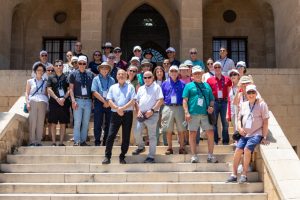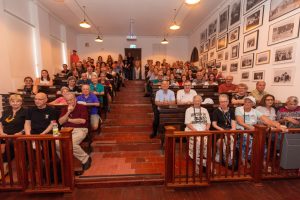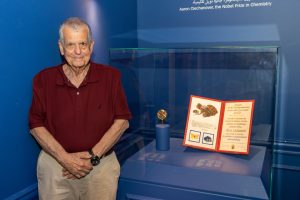Technion’s Board of Governors Meeting: Visiting the Madatech Science Museum
Inauguration of the historic Technion classroom; lecture from Nobel Prize laureate Prof. Aaron Ciechanover, who donated his Nobel Prize medal to the museum
As part of the recent Technion – Israel Institute of Technology Board of Governors meeting events, senior members of the Technion and guests from all over the world visited Madatech, the national science, technology, and space museum located in one of the University’s historic buildings. Madatech’s General Director, Yossi Ani, accompanied the visitors.
During the festive visit, the group inaugurated the historic Technion classroom and the Nobel Gallery exhibition, which will soon open to the public. Distinguished Research Professor Aaron Ciechanover, a faculty member in the Ruth and Bruce Rappaport Faculty of Medicine, gave a talk about his academic journey as well as about his discovery of the ubiquitin system, for which he won the Nobel Prize in Chemistry. Recently, Prof. Ciechanover donated his Nobel Prize medal and certificate to Madatech, along with his doctoral thesis on which he based the ubiquitin system discovery. These items will be displayed in the gallery and will serve as an inspiration to the museum’s young visitors.
Prof. Ciechanover completed his PhD at the Technion’s Rappaport Faculty of Medicine, which had just been founded at the time. He then continued on to a four-year post-doctoral fellowship at the Massachusetts Institute of Technology (MIT), before returning to the Technion. In 2004, he received the Nobel Prize in Chemistry together with Prof. Avram Hershko, also of the Technion’s Rappaport Faculty of Medicine, and American scientist Prof. Irwin Rose.
Prof. Ciechanover recounted that he and his doctoral thesis supervisor, Prof. Hershko, chose a field of research that was then considered unimportant: protein degradation. Over the course of their joint research, Profs. Hershko and Ciechanover discovered that a covalent attachment of ubiquitin to a target protein signals it for degradation and to the cellular “garbage dump.” According to Prof. Ciechanover, “the ubiquitin system manages our health by getting rid of damaged protein, but it doesn’t always function properly, and failures may lead to neurodegenerative diseases such as Alzheimer’s, and to cancer. Velcade, the first drug that was developed as a result of our discovery, partially repairs these failures. A new company which we recently founded does something similar, and we already obtained encouraging results in pre-clinical trials.”
The Technion’s Board of Governors meeting convenes every year at the Technion campus and is attended by numerous supporters of the Technion, including representatives of the Technion Friends’ Associations from Israel and around the world. During the annual meeting, various decisions are made that are pertinent to the future of the Technion. The recent Board of Governors meeting officially opened on Sunday morning with a report from Technion President Prof. Uri Sivan. The meeting continued over three days, during which discussions were held about the Technion’s different fields of activity. In addition, honorary degrees and prizes were bestowed, and various inauguration ceremonies were held.





